Literary Agents
Things you can forget now
If you think you’ve done the hard bit, forget that idea. Your journey into print is just beginning and the hard bits are still to come.
- Forget any idea you have of sending the complete manuscript off to a publisher. That’s no longer the way it works.
- Forget too, the idea that all your mistakes will be corrected by an editor. If your book isn’t already polished, a literary agent or publisher will reject it.
- Forget the idea that a publisher will promote your book. That facility is only offered to big name authors who already have successful books.
- Forget any dream you have of making a fortune. You are probably more likely to win the lottery. It can happen, but for most it doesn’t. It is possible to make enough money to make a difference, but it’s going to be hard work.
- Forget any idea you have of a publisher re-typing your manuscript. If you’ve typed your manuscript out on a typewriter you are going to have to type it again on a word processor. I know of no publisher who still accepts typewritten books on paper.
- Forget any idea you have of it being easy to find an agent or publisher. Fewer than 1 in 16 books is accepted.
You need to find a suitable literary agent to act as a go-between you and a publisher. You don't pay a literary agent, they get paid by taking a percentage of what a publisher pays for your book. Usually that's 15% to 20%. It may seem to you to be a large slice of your earnings, but a literary agent will get a higher royalty from a publisher than you would, and they know which publishers would be best for your book.
Using a Literary agent
Before you leap straight into approaching agents you need to be aware that agents reject most of what they receive and that even if you do find an agent that doesn’t mean they’ll find you a publisher. Then there’s the time scale involved. It can take years before you see your book on the shelves. Choose the conventional route and you’ll need to find an agent and discover what they require in the way of submissions. There are lots of them. Most have websites (I for one, would avoid those that are so far behind the times that they don’t have a website). So let’s start preparing what you are going to send to agents.
Do your very best to proofread your book and eliminate all errors – at least in the first 30 pages/three chapters. Once your book gets accepted by a publisher they will ask a professional proof-reader to check it. However, you won’t create a good impression with an agent or publisher if your first chapters are full of mistakes. You can’t spend enough time checking and fine tuning these first few pages. Certainly, read the section ‘Editing your book’ and use that as a guide. I also suggest you read Les Edgerton’s excellent book ‘Hooked’ and make sure you have a snappy start.
Agent enquiry letter
Experienced authors say it’s a good idea to start by sending ten agents an enquiry letter rather than sending them a full synopsis and sample chapters. Your initial letter needs to be short, but provide the agent with enough detail to catch their interest. Here’s what it should include:
- The reason you are querying this particular agent.
- A hook to catch the agent’s attention. It’s a very short synopsis. Think in terms of the text which appears on the back page of a novel and try starting with ‘When….’
- The length of the book and its genre.
- Your writing experience.
Try to keep the letter to a single page and include a stamped self-addressed envelope for a response. Need examples? Try doing a Google search for ‘agent enquiry letters’ or read author Mike Wells’ agent enquiry letter for ‘Wild Child’.
Some agents will set out on their website what they want you to send as an initial enquiry. They will want the enquiry letter plus 1/2/3-page synopsis and the first three chapters all at once. That can be expensive in printing and mailing costs so send out just a few of these, concentrating on those enquiry letter submissions first.
Finding an Agent
If you live in the UK, a good place to start would be to get hold of a copy of the Writers and Artists Yearbook. If you live elsewhere, I still recommend this book since it lists agents and publishers worldwide and is also full of useful writing tips. Visit their website at https://www.writersandartists.co.uk and buy the book – it’s published each year and is invaluable. It’s a book your local library is very likely to have.
A second source is the Poets & Writers Literary Agents Database which is searchable but mostly covers the US.
If you live in the US or Canada, then invest $25.00 in joining the Publisher's Marketplace. Their online database is full of valuable information. It’s a monthly fee so you may want to use it, stop payment and then go back if you need it later.
Once you’ve decided who to approach, explore their website to find their specific requirements. They may want your submission by email or they may require a postal submission. Of course there are some things you shouldn’t do:
Twenty ways to get an instant agent rejection
- Send a three or more page query letter.
- Start your book with a flashback.
- Start with a prologue (Yes - some experienced authors are getting away with it).
- Get someone to write the query letter on your behalf.
- Confuse some common words - of/off, to/too, there/their/they're, past/passed, allay/ally, bate/bait, affect/effect, sight/cite/site, cash/cache, accept/except, your/you're, bare/bear.
- Make lots of spelling mistakes and typos.
- Handwrite your query.
- Use lots of redundant expressions like. 'dark black', 'fiction novel', 'loud shriek' (can you shriek any other way?)
- Send your query as an email attachment.
- Beg an agent to accept your work.
- Mention how many times you’ve been rejected by other agents.
- Tell the agent how much your grandmother/aunt loves your book.
- Start by moaning about the quality of other books being written.
- Submit work which isn't finished.
- Lie to an agent. E.g. "Enclosed is the work you requested...."
- Don't include a stamped, self-addressed envelope for the reply.
- Use another author's well known character or plot.
- Include lots of profanity on the first pages.
- Submit work less than 60,000 words long.
- Submit a first novel of more than 120,000 words.
Writing a synopsis
How do you shoehorn a 120,000-word book into a one/two/three-page synopsis? How about a one paragraph synopsis? The answer is to follow this formula:
[Protagonist] who finds himself/herself in [situation] from which he/she tries to free himself/herself by [goal]. However, the [antagonist] wants to stop [protagonist] from this, and if successful, will cause the [protagonist] to experience [disastrous result].
Here’s an example of its use:
When a young girl moves to live with her father in a small town in Washington, she meets the boy of her dreams. He has a dark secret which she discovers. In doing so, she finds herself at risk of death from people like him. She is rescued by her new boyfriend, but still is at risk from others like him who want to kill her. She knows that all will be solved if she shares her boyfriend’s secret, but he is reluctant to allow this since he fears it will turn her into a monster.
Recognize the story? Twilight?
You should also remember that agents and publishers are susceptible to a good hook too. Here's one I heard recently:
"Could you murder your wife to -save your daughter?" That's the hook sent to Adam Croft's publisher for his book 'Her Last Tomorrow'.
If you find this guide useful...
Check out my Author! Author! blog at Blogspot which is full of useful tips on book promotion.
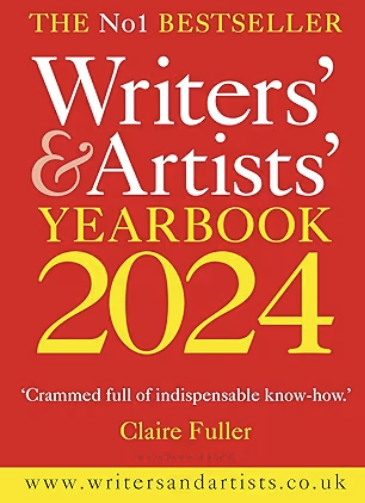
The Author's Friend - Mr Coffee
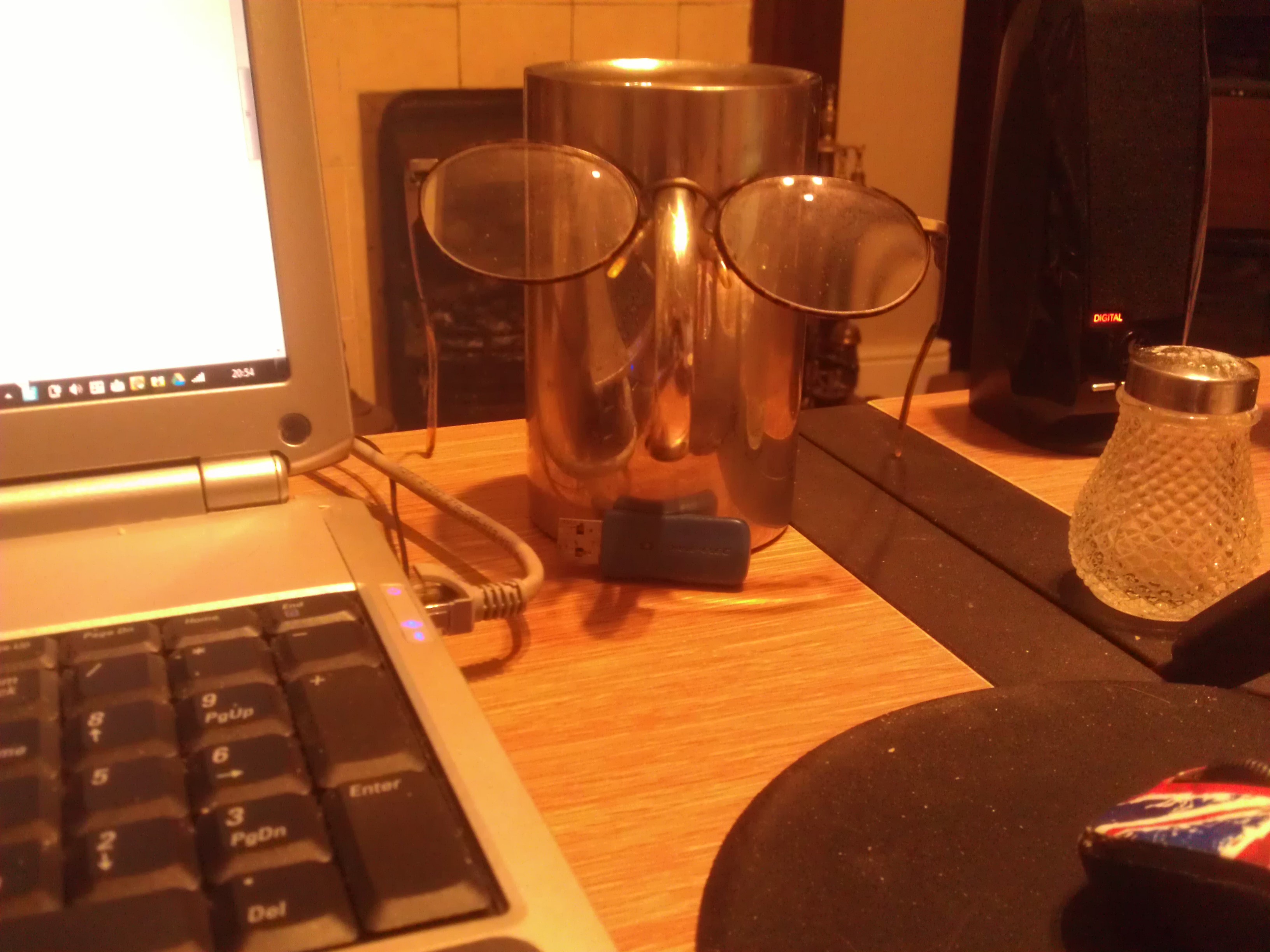
... and if that fails, there's always tequila.
Seriously when spending hours at a computer it's important to take breaks and stay hydrated. Coffee is a must for me; to tell the truth, I've never tasted tequila. Some people drink water. I do too, but buying bottled water is one of those things I object to. Drinking tap water is something I avoid. My local water authority makes our water safe with chlorine and adds a fluoride to 'help' children's teeth. I also live in an old house (1880) in an area where lead mining used to occur. As an ex-chemistry teacher I know what that means. I don't like the taste of chlorine, definitely don't want any more heavy metals and while fluorides may help some children's teeth, in adults it only causes harm. Adults today have probably consumed enough fluoride compounds to protect their teeth and additional fluorides can lead to joint problems.
The solution? I fitted a reverse osmosis water filter to my water supply. It takes out heavy metals, chlorine compounds and fluorides. It also removes a lot of other nasties. To it I added a second re-mineralization filter to put back the 'good' calcium and magnesium minerals
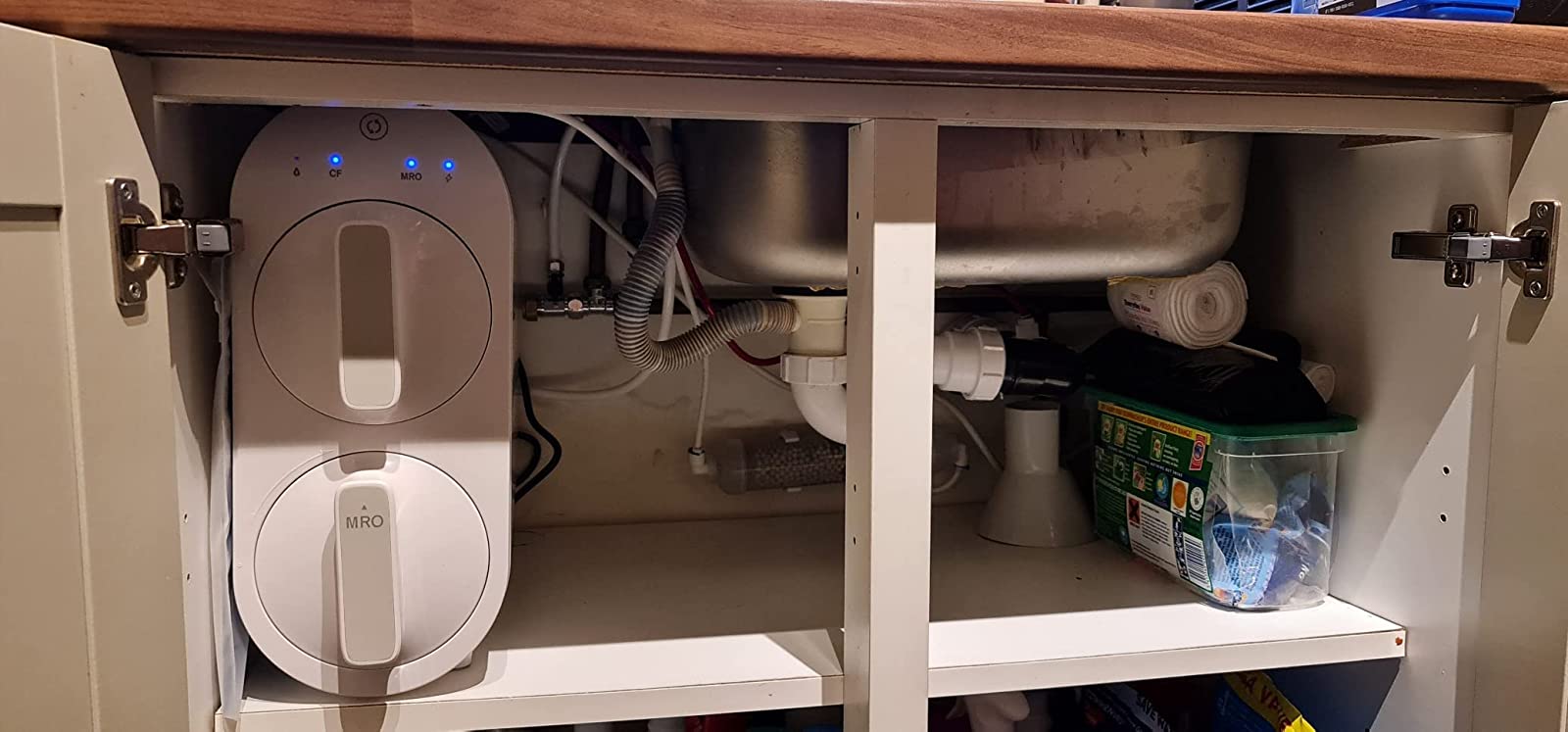
At £299 it's expensive but saves a fortune on bottled water, makes tea and coffee taste great and is much better than tap water in the 'good for you' stakes.
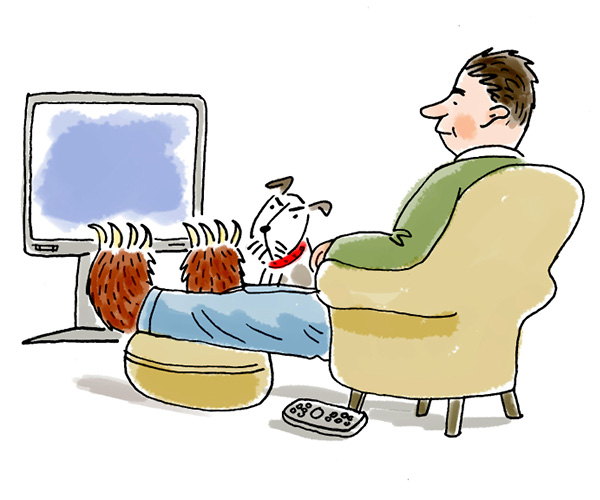
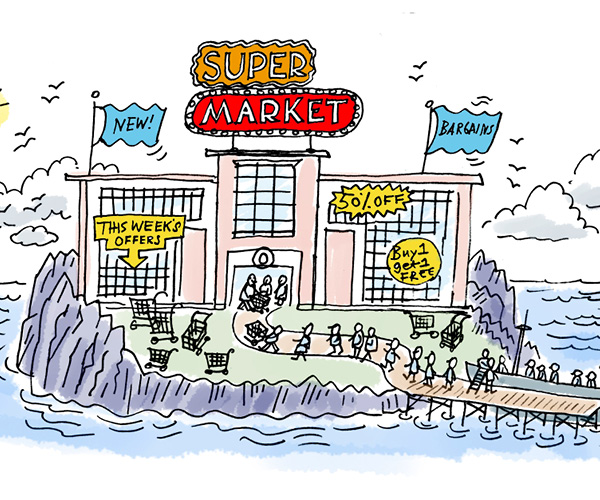
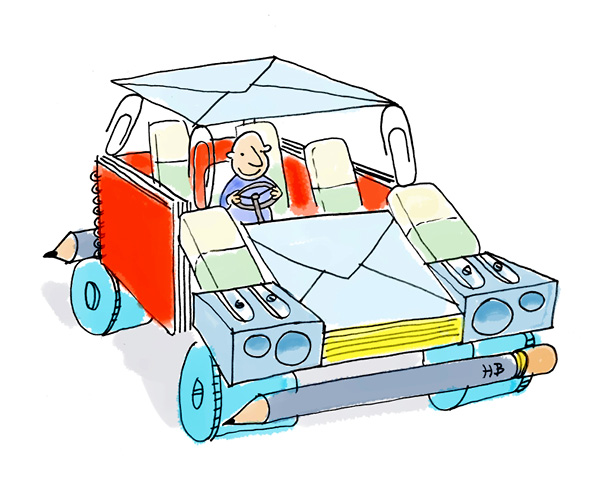
What next?
If an agent responds to your query letter he/she will probably ask for a more detailed synopsis and sample chapters from your book. At that point you send them the longer synopsis which shouldn’t be a problem now and your fine-tuned first 30 – 50 pages (three chapters). It’s far more likely to be studied after your successful query letter and you won’t be wasting a fortune on printing and postage. Include also a stamped self-addressed envelope so that these can be returned to you for re-use if the agent decides not to proceed further.
Formatting the Agent Manuscript Sample
In general, you’ll need to use a different format to the format you would produce for printing a book. Your agent’s website will probably detail how they wish the text you send them to be formatted but if not try:
- Font style: Garamond or Times New Roman
- Font size:12 point
- one-inch margins (2.5cm) at left, right, top and bottom
- about 0.5-inch (1cm) paragraph indentations
- Double space, no extra lines between paragraphs, unless this is for a text break
- Left align the text.
- Add page numbers, starting with the first page of the story, not the title page
- Indicate scene breaks with a blank line, then centering one of the following: ---, *, or ***, followed by another blank line.
- The page header should contain: Last name / title / page number, for example: CHAPMAN/Immortality Gene/1.
- At the end of a chapter, insert a page break, and start the next chapter on a new page.
- Center the chapter title (even if it’s just Chapter One or Chapter 1), put two blank lines before and after it. (That's NOT good practice but OK for this copy which will only be printed out)
- At the end of your text hit Return, then center 'Sample End.' Do this so you don’t leave the agent wondering if they have read all the pages or not. It’s not always obvious to an agent when they’ve reached the end of a story sample.
- If you want to show thoughts, remote side of a telephone conversation or emphasis on a word, use italics.
- Do not underline anything
- Use a single space at the end of a sentence; double spaces went out with typewriters.
Or maybe a FREE online interactive adventure story?
Back in 1982 early text only adventure games were being written for home computers. One such game was 'Castle of Riddles' written by Peter Killworth and published by Acornsoft. Now it's been re-written and greatly expanded with added images and sound. Take the occasional break and play it on your computer, tablet or even a phone.
Check it out at https://jaydax.co.uk/corr
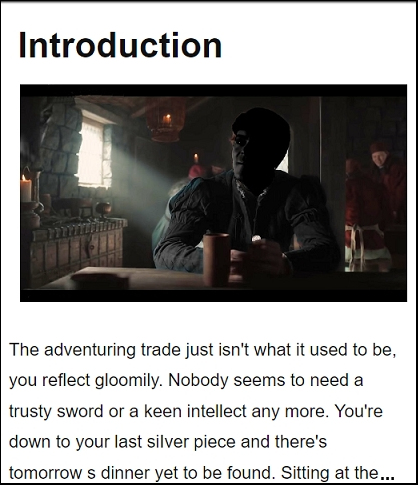
Unlike the original game, this version doesn't ask you to start from the beginning every time you get killed. Just as well, because there are 49 ways to die and one ending is worse than death. There's a very useful 'back' button which allows you to step backwards through the game.
Rejected?

One thing you should be prepared for though; agents are absolutely inundated with submissions. They probably will take a while to look at what you wrote and may very well return your submission. Few are accepted. If that happens – don’t give up, try a different agent. I’ve seen reports that an average agent accepts just 2% of authors who approach.
The chances are you’ll probably get discouraged by rejections. At that point you should take a serious look at what you’ve submitted. At the risk of repeating myself, this is what you need to check:
- Does it have that hook to catch interest? In other words, does it catch your interest in the very beginning? Think of how you browse for books in a bookstore. Would you buy your book based on the content of the first three pages? Here’s the opening paragraphs from Jackie Collin'sThe Power Trip
The couple on the bed had sex as if it was their final act. And for one of them it was. Neither of them heard the door slowly open.
Would that make you want to keep reading? - Get someone else to read the synopsis you include. Do they find it interesting?
- Does it have a prologue? If so, get rid of it. For many agents a prologue is an instant turn-off. Could your prologue be renamed ‘Chapter 1’?
- Is the story the right length? It should be 60,000 - 120,000 words. Any shorter and publishers will be reluctant to publish it because setting it up will be too expensive. Any longer and it will be too expensive to edit and they’ll be reluctant to invest so much in an untried author.
- Is your accompanying letter good enough?
If you are confident that you have met all these requirements, continue making multiple submissions to agents at the same time rather than one at a time. Agents don’t really like you doing this but often it’s the only way to cut submission times from years to months.
Consider going down the self-publishing route. The one thing you shouldn’t do is to allow yourself to be discouraged to the point where your book is never published ‘because it isn’t any good’. Repeated rejections are quite normal. Few authors ever find success immediately. I know of one successful author who bound all her rejection letters into a long roll and when she’s asked to speak about the process dramatically allows it to unroll across the room.
Got the agent - what can you expect?
Publishers - Your agent will know which publishers are the best to approach.
Negotiation - Your agent will negotiate the best deal on your behalf. It’s in their interest to do so because they will get 15% of what you earn. If they receive positive feedback from several publishers, they may hold an auction to get the best deal. This will be a combination of an advance and royalties.
Royalties - Your agent will, if needed, check that royalties due are being paid.
Timeline - Once your agent has made a deal with a publisher, within two years you can expect to see your book published. Yes – It can take that long!
Paying an Agent? - Never, ever, get involved with an agent who wants you to pay them a fee of any sort. That’s not how it works. Agents get their fees from the publisher not the author. Any so called ‘agent’ who demands a fee is a con-artist.
Had more than 30 rejections?
If you have repeatedly fine-tuned your submissions and still keep getting rejected, maybe it’s time to consider publishing independently. Alternatively, you could look at rejections as a test of character. Agatha Christie, who sold $2 billion worth of books, was given rejection after rejection for five years before she was accepted.
As an Amazon Associate, I earn from qualifying purchases.
Want a short story instead?
I've written a number of short time travel stories. Each is 77p/99¢ and great for taking a break from Writing.
Check them out at http://iwadasn.info
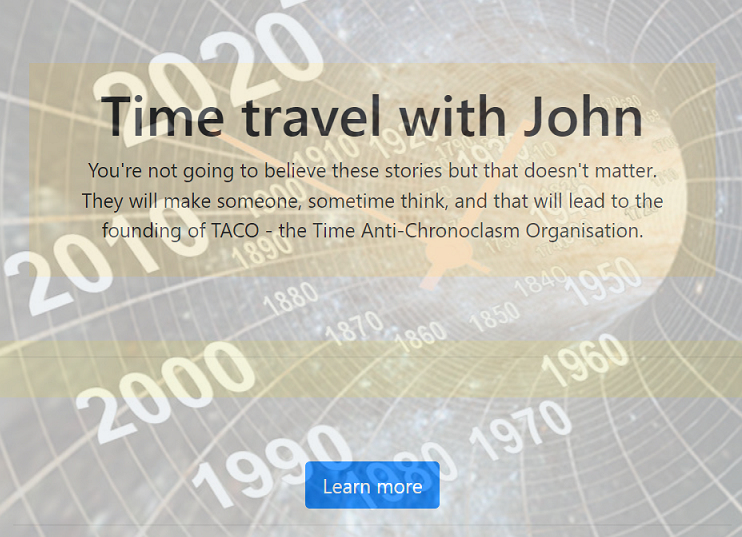
Better than buying the inndividual stories, get them in a collection because that is the same 77p/99¢ for all four of the stories!
Get it via https://books2read.com/tat. Remember that Books2Read site. It's a useful free link shortener directing readers to their favourite retail site which might not be Amazon.